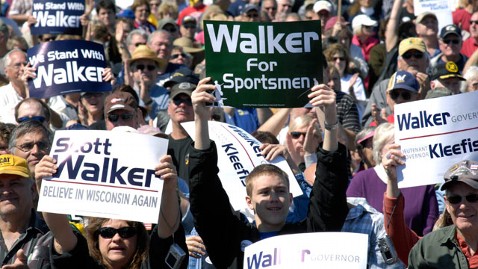Walker Wins, But Obama Bests Romney in Wisconsin

Mark Hertzberg/AP Photo
Even with Scott Walker's success, Barack Obama won some bragging rights in the Wisconsin governor's recall election: Voters said they favored Obama over Mitt Romney in November's presidential race by a 9-point margin, with advantages for Obama both on handling the economy and aiding the middle class.
Wisconsin voters by 52-43 percent said they'd support Obama over Romney if the election were today, the ABC News exit poll found, by 43-37 percent picked Obama to do a better job than Romney handling the economy and by 47-36 percent preferred the president on "helping the middle class."
Obama's lead over Romney was only slightly narrower than his 56-42 percent win over John McCain in Wisconsin in 2008. In a race portrayed as potentially indicative of the president's fortunes five months from now, it showed that he can remain competitive even in the face of the still-weak economy he'd pledged to repair.
Independents - key swing voters in national elections - said they preferred Obama over Romney by 56-37 percent, again near the Obama-McCain result among Wisconsin independents, 58-39 percent, in 2008. And there was a vast gender gap, with Obama preferred Tuesday by a broad 60-34 percent among women, while Romney led by a closer 51-45 percent among men. In 2008 Obama won women in Wisconsin by 21 percentage points, but also won men, by 7.
The results, analyzed for ABC by Langer Research Associates, provided Obama forces with pushback even as Walker, the incumbent Republican, prevailed in the recall election against Democratic candidate Tom Barrett, the mayor of Milwaukee.
Barrett lost to Walker when the two faced off in 2010. One boost for Barrett this year came from turnout among union voters: One-third of voters said they were from union households, up from 26 percent two years ago, and those voters favored Barrett by a broad 62-37 percent. It was about the same margin as Barrett won among union household voters in 2010, although this time there were more of them.
Barely more than half of the state's voters, 51 percent, said they have a favorable impression of public employee unions; Walker-backed restrictions on such unions incited opposition that led to the recall election.
Voters were closely divided on Walker's handling of collective bargaining, 51 percent approving, 48 percent disapproving; there was a similar split specifically on the state law limiting the ability of government workers to bargain collectively. Both results included unusually high levels of strong sentiment on both sides. Women were notably more critical of Walker on the union issue than were men.
One striking feature of the Walker-Barrett race was the gender gap; Barrett had a 7-point advantage among women, 53-46 percent, compared with his very slight 51-48 percent edge among women against Walker two years ago. Tuesday, as in 2010, Walker led easily among men - a 17-point margin that produced his victory.
Another result pointed to what may have been a key advantage for Walker: Voters approved rather than disapproved of his performance creating jobs, by 53-46 percent.
Democrats and Republicans were equally matched, 34-34 percent, similar to their 1-point gap in 2010 and down from a 6-point Democratic advantage in 2008. Independents were up slightly from two years ago - 31 percent of voters Tuesday, compared with 27 percent in 2010.
Ideological divisions were similar to their levels two years ago - Barrett beating Walker by 9 points among moderates, but Walker coming back strongly among conservatives, who outnumbered liberals by 14 percentage points.
Another result helped Walker: Wisconsin voters by 51-44 percent were more apt to say government "is doing too many things better left to businesses and individuals" than to say it "should do more to solve problems." The former view typically draws more votes for Republican candidates, and indeed Walker led among those who expressed it by 75-24 percent.
Walker had an advantage in turnout: The exit poll found that he beat Barrett by 12 points among voters Tuesday who said they'd participated in the 2010 election. (One in six voters said they didn't vote in 2010, or voted for someone else; they favored Barrett by 19 points.)
As perhaps expected in a recall election, Walker himself was the issue. Among his supporters, 88 percent said they were chiefly voting for him, rather than against Barrett. Among Barrett's supporters, on the other hand, it was much more evenly divided - 50 percent were for Barrett, while 47 percent of his supporters said they chiefly were casting anti-Walker votes.
Voters expressed nearly identical opinions of both political parties, with just fewer than half expressing a favorable opinion of either the Democrats (46 percent) or the Republicans (49 percent). And there was a sour note for the recall process itself: Six in 10 said recalls are appropriate only for reasons of official misconduct. They showed up to vote nonetheless.
Finally, all the spending on campaign advertising in the last month - disproportionately by Walker and his supporters - may ultimately not have made much difference: Nearly nine in 10 Wisconsin voters said they'd made up their minds at least a month ago.
(This report was updated with the latest exit poll results as of 10:42 p.m.)
By Gary Langer, with Patrick Moynihan, Gregory Holyk and Lillian Nottingham.